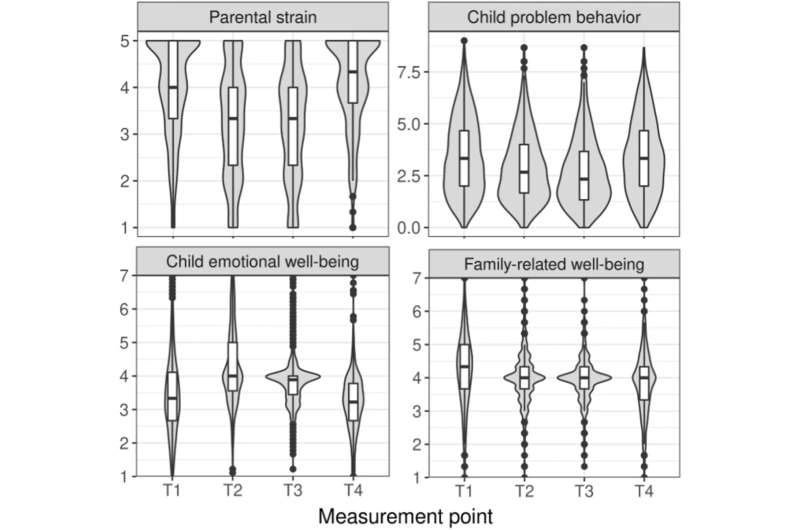This article has been reviewed according to Science X's editorial process and policies. Editors have highlighted the following attributes while ensuring the content's credibility:
fact-checked
trusted source
proofread
Study shows COVID-19 pandemic has had long-term impact on families

In retrospect, the COVID-19 pandemic seems to consist of an ebb and flow of lockdowns and periods of loosened restrictions. But for children and families, the long-term effects have been predominantly negative since the first lockdown in the spring of 2020.
A team at the Chair of Developmental Psychology and Educational Psychology at LMU, led by Professor Markus Paulus, has shown that although the well-being of children temporarily recovered after the first lockdown was over, the pandemic had a negative impact when considering the period as a whole. A major factor was parental stress.
"The lockdowns were of course tough. But our study also shows that the well-being of families decreased over the entire period of the COVID-19 pandemic," says Samuel Essler, one of the authors of the study, who works at the Chair of Developmental Psychology and Educational Psychology.
Parental stress impacted children
The study is the first to investigate the long-term psychosocial well-being of children across the various phases of lockdown and relaxation. "It's the first study that's able to differentiate the general effects of the pandemic on child well-being from lockdown-specific effects," says Markus Paulus.
In the first instance, the results confirm the importance for children of having contact with other children the same age. The well-being of children decreased during the first lockdown due to their isolation from their peers. At the same time, some families managed to benefit from suddenly having more time for each other. However, this effect was not to last. In fact, the well-being of the entire family continuously declined up until the end of the study period in the winter of 2020/21. Even independently of the lockdowns, this negatively affected children.
A strong risk factor for the emotional situation of the children was increasing parental stress. The more stressed the parents were, the worse the children fared. This became particularly apparent when the second lockdown began.
Only a good parent-child relationship protected children from excessively negative impacts of the pandemic—it was a "resilience factor," as Essler puts it.
The study involved asking families about their well-being in the period from spring 2020—and thus the first lockdown—to the end of the most recent lockdown in March 2021. It investigated emotional difficulties, behavioral problems, and hyperactivity in children, the well-being of the family as a whole, parental stress, and the quality of the relationship between parents and child.
The research is published in the journal European Child & Adolescent Psychiatry.
More information: Samuel Essler et al, Short-term and long-term effects of the COVID-19 pandemic on child psychological well-being: a four-wave longitudinal study, European Child & Adolescent Psychiatry (2023). DOI: 10.1007/s00787-023-02215-7

















